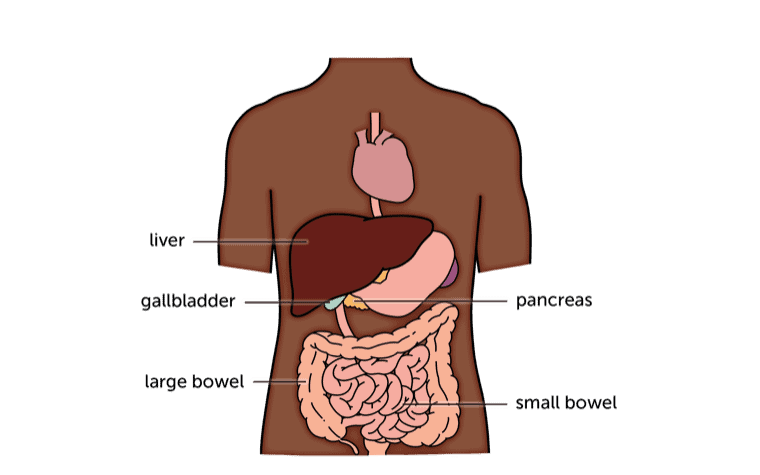HCC stands for hepatocellular carcinoma. Hepato- is Greek for liver. Carcinoma means cancer. HCC is a cancer of liver cells.
Cancer means that some abnormal cells have started to multiply more than they should. The extra cells form a lump (tumour).
There are as many different types of cancer as there are types of cells in the body. In HCC, the cancer starts in liver cells called hepatocytes. Around three quarters (75%) of all cancers that start in the liver (primary liver cancers) are HCC.
The liver
This is the largest organ in the body. It is on the right side, just under your ribs. It has two lobes, the right and left. The diagram below shows where the liver is and the other body organs around it.

You have millions of hepatocytes in your liver. Each cell lives for around 150 days and they are constantly being replaced. As well as hepatocytes, there are other types of cell in the liver, for example, those lining the bile ducts. These can also become cancerous, so there are other types of liver cancer as well as HCC.
What the liver does
The liver is as vital for your health as your heart. It has over 500 different functions. These are the main ones:
- Breaking down and storing nutrients from your diet. After digestion, nutrients are carried to the liver from the intestine, via the hepatic portal vein. The liver processes them so they can be used to build and repair body tissues.
- Making substances your body needs for blood to clot. This is vital to prevent loss of blood from cuts or injuries.
- Making bile, which is stored in the gallbladder and released into the intestine after you’ve eaten, to help digest fat.
- Removing and processing anything harmful in the blood, including alcohol and drugs.
Different types of HCC
HCC can grow in different ways. Sometimes it grows as a single tumour, which is contained in the part of the liver where it started. The tumour doesn’t usually spread to the rest of the liver until it is advanced. Doctors call this type ‘unifocal’.
Other HCC’s develop as many small tumours, spread through the liver. This type is more common in people who already have liver damage (cirrhosis) caused by something else. Doctors call this ‘multifocal’.
There is a rare type of HCC called fibrolamellar cancer. About 1 in 20 (5%) HCC’s are this type and it’s more often diagnosed in teenagers and young adults. If their cancer can be removed, people with fibrolamellar liver cancer may do better because they are less likely to already have liver disease.
Content last reviewed: October 2022
Next review date: October 2025
